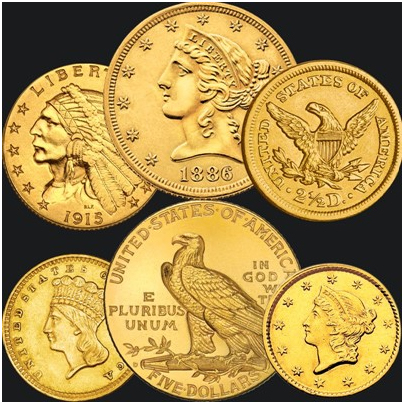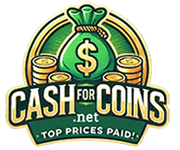
Inheriting an Old Coin Collection: How to Determine Its Worth and What to Do Next A Step by Step guide
Inheriting an old coin collection can evoke a range of emotions—from excitement and curiosity to uncertainty about what to do next. Whether the collection was a cherished hobby of a loved one or an unexpected discovery in an attic, it has the potential to be both sentimentally and financially valuable. Understanding how to assess and manage the collection is crucial, whether you intend to keep it, sell it, or pass it on to someone else. This comprehensive guide will walk you through the process of determining the value of an inherited coin collection and the steps to take to maximize its potential.
- Taking Inventory: The First Step in Understanding What You Have
The first and most important step when you inherit a coin collection is to take a detailed inventory. This process will help you understand what you have and begin to assess the collection’s potential value. Don’t rush it, take your time, take clear pics.
- Categorize the Coins: Start by sorting the coins by type, country of origin, and denomination. For example, group together all the pennies, nickels, dimes, and quarters from the United States, or separate coins by their country of origin if the collection is international. Another way to sort is by precious metal content like gold coins and silver coins.
- Record Key Details: Create a detailed list or spreadsheet that includes each coin’s year, mint mark, denomination, and any special features such as errors or unique designs. This documentation will be invaluable for future appraisals or sales. By using a spreadsheet, you can send the list to multiple potential buyers and have every make their best bids, it also provides the easiest way to compare across a number of items.
- Identify Potential Highlights: Look for coins that seem unusual or particularly well-preserved, meaning look like there new even though they are old. Coins with low mintage numbers, errors, or significant historical context may be more valuable than others. Errors is also something to look for. Is the date stamped twice, are letters missing, are there 2 heads…
- Understanding Coin Condition: Why It Matters
The condition of a coin, often referred to as its “grade,” is one of the most significant factors affecting its value. Coins are graded on a scale from Poor (P-1) to Mint State (MS-70), with higher grades indicating better condition and, usually, higher value. The numismatic grading scale is called the Sheldon scale
- Look for Wear and Tear: Coins that show little to no wear and retain sharp details are generally more valuable. Coins that have been in circulation and show significant wear are usually worth less, though there are exceptions for rare coins.
- Check for Damage: Scratches, dents, discoloration, and other forms of damage can significantly decrease a coin’s value. Coins that have been cleaned or altered are also typically less valuable, as collectors prefer coins in their original condition.
- Patina, tone and Natural Aging: Over time, coins develop a natural patina, a thin layer that forms on the surface due to exposure to the environment. While it might be tempting to clean the coins to make them shine, it’s best to leave the patina intact, as it can actually enhance the coin’s value by preserving its historical authenticity. NEVER CLEAN YOUR COINS. Some collectors pay significantly more for what are referred to as Monster toned coins.
- Researching the Value: How to Identify Valuable Coins
Once you’ve inventoried the collection and assessed the condition of each coin, it’s time to research their potential value. This step will give you a clearer understanding of whether you’re sitting on a collection of common coins or a hidden treasure.
- Use Reference Guides: Books like the “Red Book” (A Guide Book of United States Coins) are excellent resources for determining the value of U.S. coins. For international coins, consider resources like Krause’s “Standard Catalog of World Coins.” These guides provide estimated values based on coin type, date, mint mark, and condition. Our favorite is Greysheet one of the oldest and most reputable sources.
- Online Resources and Databases: Websites like NGC (Numismatic Guaranty Corporation) and PCGS (Professional Coin Grading Service) offer online databases where you can search for your coins and find detailed information on their value. These sites often include recent auction prices, which can give you a more current market value. Again visit Greysheet.com
- PCGS Photograde is an invaluable tool for anyone looking to determine the grade of a coin, especially if you’re new to coin collecting or inheriting a collection. This free online resource provides high-quality images of coins at various grades, allowing you to visually compare your coin with professionally graded examples. By matching your coin to these images, you can estimate its grade more accurately, which is crucial for determining its value. Whether you’re dealing with U.S. coins or world coins, PCGS Photograde offers an easy-to-use platform to help you understand the grading process. You can access PCGS Photograde here: https://www.pcgs.com/photograde/
- Identify Rare and Valuable Coins: Pay special attention to coins that are known for their rarity or historical significance. These might include:
- Error Coins: Coins with minting errors, such as double strikes, off-center images, or misprinted dates.
- Low Mintage Coins: Coins that were produced in limited quantities, making them rare and often more valuable.
- Commemorative Coins: Special edition coins minted to commemorate significant events or figures.
- Consulting with a Professional Appraiser: When and Why You Should Do It
While your initial research can provide a rough estimate of your collection’s value, a professional appraisal is essential for an accurate valuation. Professional appraisers have the expertise and experience to properly assess the condition, rarity, and market demand for your coins.
- Accurate Valuation: A professional appraiser can provide a precise estimate of each coin’s value, taking into account factors like condition, market trends, and recent auction results.
- Certification: If you plan to sell the collection, having your coins professionally graded and certified can significantly increase their market value. Certified coins are more trusted by buyers and often sell for higher prices.
- Market Guidance: Appraisers can also offer insights into the current coin market and advise you on the best time to sell your collection, if that’s your intention.
- Online assistance: Reliable businesses like www.cashforcoins.net provide an enormously beneficial service to those with estate collections or inherited coin collections. With Free detailed coins value reporting and actual cash offers along with a nationwide database of coin dealers, Cash for coins has solidified its position as the top one stop shop for selling coins and estate collections.
- Deciding What to Do with the Collection: Keep, Sell, or Pass On?
After you have a clear understanding of the collection’s value, you’ll need to decide what to do with it. Your decision will likely depend on both the monetary value and the sentimental value of the coins.
- Keeping the Collection: If the collection has sentimental value or you’re interested in coin collecting as a hobby, you may decide to keep it. Preserving and potentially expanding the collection can be a way to honor the memory of the person who collected it. Also, many coins and precious metals tend to appreciate over time proving to be solid investments. They also go down too, especially with precious metals, the price fluctuates daily. Also its not an all or none scenario, in most cases people sell some of their collections and pick out a few important pieces for themselves or their children.
- Selling the Collection: If you decide to sell, you have several options, each with its own advantages and drawbacks:
- Auction Houses: Reputable auction houses can help you reach serious collectors and potentially fetch higher prices, especially for rare coins. If you have very valuable coins contact us and we can introduce you to the very best in numismatic auction houses.
- Coin Dealers: Local coin dealers offer the convenience of a direct sale, but they may take a commission. It’s important to shop around to get the best offer. If you want to find local coin dealers feel free to visit our Nation Wide directory of coin dealers
- Online Marketplaces: Platforms like eBay allow you to sell directly to buyers, giving you more control over the sale process, but it can be time-consuming and requires managing the listing and shipping. They also charge high fees in many cases 15% or more, and you have to deal with shipping the coins to individuals along with potential returns or false claims.
- Coin Shows: Selling at coin shows can be an effective way to connect with multiple buyers and dealers in one place, potentially maximizing your returns. We STRONGLY advise that before you sell coins at coin shows you have a solid understanding of what coins you have and what they are worth so you do not get taken advantage of. It why we created our free offer tool, this allows you to receive a free no obligation offer for your coins, this way you know their value and you take that with you to the coin shows or local coin dealers. This way you can have confidence that they either match or beat the cashforcoins price or you know we will buy them from you at those prices. Visit www.cashforcoins.net home page scroll down to select the coins your looking to get offers on, if you don’t see them you can get a custom coin value & quote here
- Passing It On: You may choose to pass the collection on to another family member who shares an interest in numismatics or who values the collection for its sentimental significance. If you have young kids we always remind our clients to keep at least something from the collection to give to their kids when they are old enough. We can even help guide them on what to keep for family vs what to sell. Everyone appreciates a gift from a relative who is no longer with us it provides a tangible connection.
- Preserving the Collection: How to Store Coins Safely
Whether you decide to keep the collection for yourself or pass it on, proper storage is essential to preserving its condition and value over time.
- Use Protective Holders: Store coins in acid-free holders, coin flips, or albums specifically designed for coin storage. These protect the coins from physical damage and environmental factors.
- Control the Environment: Coins should be stored in a cool, dry place, away from direct sunlight. Extreme temperatures and humidity can cause coins to tarnish or corrode. Damp garages not god, moderate climate controlled areas are most suitable.
- Avoid Handling: If you need to handle the coins, do so with care. Use gloves and hold the coins by their edges to avoid leaving fingerprints, which can damage the surface. Our skin contains oils that over time can harm the surface of a coin.
- Insurance: If the collection is particularly valuable, consider insuring it. This can protect against loss, theft, or damage.
- Selling the Coin Collection: Tips for Getting the Best Price
If you’ve decided to sell the collection, here are some additional tips to help you get the best price:
- Get Multiple Appraisals: Before selling, it’s a good idea to get multiple appraisals to ensure you’re getting a fair price. Different dealers may offer different prices based on their own market knowledge and customer base. To get a free appraisal on coins, gold & silver click here.
- Understand Market Trends: The value of coins can fluctuate based on market demand, economic conditions, and trends in the numismatic world. If the market is down, it might be worth waiting to sell until prices rebound. This is most relevant for gold or silver coins as spot prices fluctuate for real time spot prices on gold and silver click here
- Negotiate: Don’t be afraid to negotiate with buyers. If you’ve done your research and know the value of your coins, you’ll be in a stronger position to secure a good deal. Once again we suggest going in with an offer in hand this way if they don’t beat it you know you can get more from another company. Feel free to ask us for a free estimate or offer
- Consider Selling in Lots: If the collection includes a large number of common coins, selling them as a lot rather than individually might be more efficient and profitable.
- Beware of Counterfeits: Protect Yourself and Your Collection
Counterfeit coins are a common problem in the numismatic world, and it’s important to ensure that the coins in your collection are genuine before attempting to sell them.
- Authenticate the Coins: If you suspect that any of your coins might be counterfeit, have them authenticated by a professional. This is especially important for high-value coins. PCGS, NGC and CAC are the top 3 coin grading companies, ANACS is the 4th. Only use one of those as coin dealers will not value a certification or grade from a company other than the ones just listed.
- Deal with Reputable Buyers: When selling the collection, make sure to work with reputable dealers and auction houses that have a good track record and are well-respected in the numismatic community. Check their reviews, not the ones on their websites, look for independent reviews like those on Trustpilot.
- Understanding Tax Implications: What You Need to Know
If you decide to sell the coin collection, be aware that there may be tax implications. In many cases, profits from the sale of coins are subject to capital gains tax. In most cases selling coins are not reported unless the total amount is substantial. Each state has its own laws.
- Consult a Tax Professional: Before selling, it’s a good idea to consult with a tax professional who can advise you on your tax obligations and help you plan accordingly.
- Keep Records: Maintain detailed records of the sale, including purchase prices (if known), sale prices, and any appraisal fees. This information will be important when filing your taxes if necessary. But again in most cases the sales of coins or precious metals is not reported or taxed.
- Appreciating the Historical and Sentimental Value
Coins are more than just financial assets; they often carry historical significance and sentimental value. Understanding the history behind the coins in your collection can deepen your appreciation for them and help you make informed decisions.
- Research the Coins’ History: Learn about the coins’ origins, their place in history, and the stories they might tell. This knowledge can add to the sentimental value of the collection and help you decide whether to keep or sell.
- Preserve Family Legacy: If the collection was passed down through generations, preserving it can be a way to honor your family’s legacy and keep a piece of history alive. We always tell people they should keep some for their children as a tangible connection to the collect who is no longer with us.
Inheriting an old coin collection is a unique opportunity that can be both financially rewarding and emotionally fulfilling. By taking the time to properly inventory, research, and assess the collection, you can make informed decisions that respect both the monetary and sentimental value of the coins. Whether you choose to keep, sell, or pass on the collection, understanding its worth and history will ensure that you make the most of this valuable inheritance. By following the steps outlined in this guide, you can navigate the complexities of managing an inherited coin collection with confidence and care. Cashforcoins.net was created to help people in this situation, we have worked in all 50 states and are here to help you regardless if you sell to us or not. We only want to make sure you are able to make the most informed decision possible.


